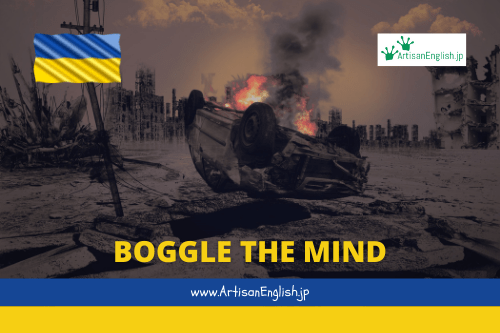
YouTube / iTunes / Spotify / Radio Public / Pocket Casts / Google Podcasts / Breaker / Overcast
Listen to ArtisanEnglish.jp posts & lesson intros here.
Phrase: Boggle the mind
If you are a driver, you already know the most dangerous person on the road is the other person, not you.
It just boggles the mind what people do while driving.
Putting on makeup while driving at 100km/h on the highway, tailgating, reading magazines or playing video games are just a few of the things people do that boggle the mind.
And these are everyday things.
When something boggles the mind, it is so outlandish, abnormal or complex that we cannot understand or comprehend it.
That’s what Putin did at the end of February – he managed to boggle the minds of hundreds of millions of Europeans and the rest of us too.
Even as he amassed a vast invasion force on the borders of Ukraine in plain sight of the world, we failed to comprehend the danger Europe was facing.
His behaviour was too abnormal for us to understand.
We can imagine heavy snowfall in Canada or earthquakes in Japan.
Then there are others, such as a North Korean nuclear attack on Tokyo or the Russian armed forces invading Ukraine, that are so outlandish they boggle the mind.
Just thinking about them requires all of our energy because we feel it is an impossibility.
Well, not anymore.
We are now living in the first days after the Cold War era ended, and anything is possible.
The future is a complete unknown, a no-holds-barred place where things that would have boggled the mind just a few weeks ago are as real as a hot summer’s day.
Grab your pencils and notebooks, boys and girls; we’re going to rewrite the future.
Flesch-Kincaid Readability Test
This post is understandable by someone with at least an 8th-grade education (age 13 – 14).
On the Flesch-Kincaid reading-ease test, this post scores 69.
The easier a passage is to read, the higher the score on a scale of 0 – 100.

